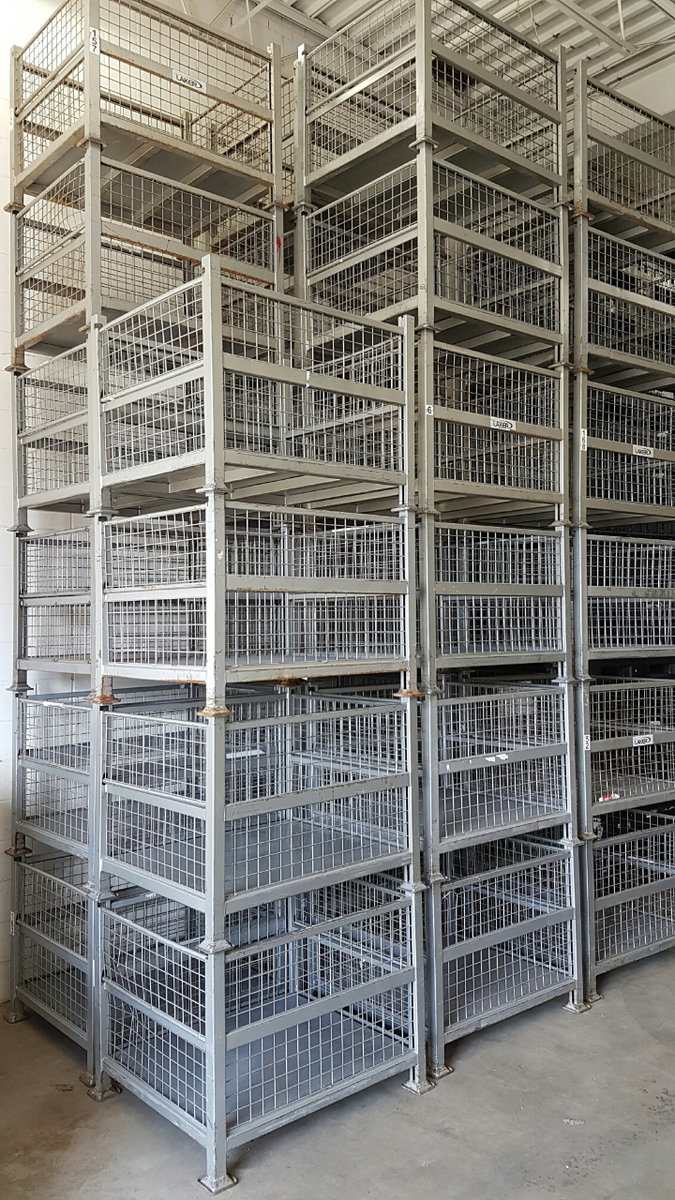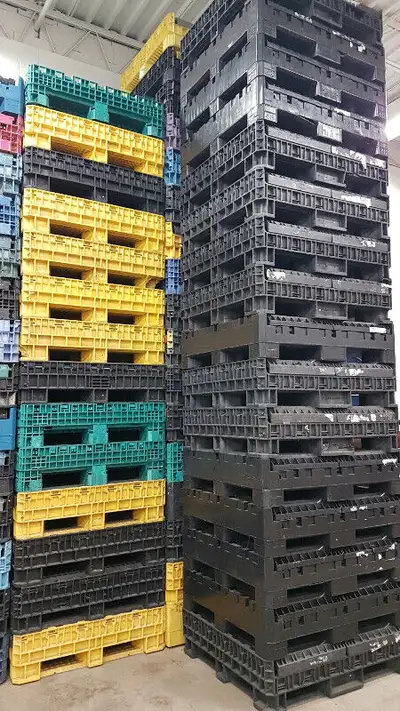How used collapsible bulk containers support cost-effective operations
Wiki Article
The Ultimate Guide to Selecting the Right Mass Containers for Your Service Needs
Choosing the ideal mass containers is crucial for any type of organization that counts on efficient logistics. Different kinds of containers exist, each designed for specific materials and applications. Aspects such as dimension, material compatibility, and governing standards play a considerable function in this decision-making process. Recognizing these components can cause improved operational effectiveness. Several businesses forget vital elements that could boost their overall performance and sustainability. What are these considerations?Understanding Various Kinds Of Mass Containers
Bulk containers serve as important tools for services looking for effective storage and transportation services. These containers can be found in different types, each developed to meet details functional requirements. One typical type is the intermediate bulk container (IBC), which is excellent for fluid and granulated materials, providing an equilibrium of ability and ability to move. One more popular alternative is the bulk bag, or FIBC, appropriate for completely dry, flowable items. These adaptable containers are light-weight and can be quickly transferred and stored. For much heavier materials, stiff bulk containers are usually used, providing longevity and security for risk-free handling. Additionally, there are specialized containers tailored for unsafe products, ensuring conformity with safety regulations. Recognizing the distinctive qualities of these bulk container kinds allows businesses to make informed choices that optimize logistics and minimize expenses. By choosing the best container, companies can improve their functional efficiency and enhance their supply chain processes.Trick Material Considerations for Bulk Containers
When choosing mass containers, it is vital to ponder the products used in their building. Elements such as longevity, chemical, and toughness compatibility play an essential role in ensuring the containers meet specific operational demands. Furthermore, weight and mobility issues can impact both performance and transportation logistics.Product Resilience and Toughness
Longevity and stamina are vital elements in choosing materials for bulk containers, as they straight influence the container's capability to stand up to various environmental conditions and taking care of processes. Products such as high-density polyethylene (HDPE), polypropylene, and stainless-steel are typically favored for their robust homes, using resistance to influence, temperature, and abrasion fluctuations. The selection of material likewise affects the overall life expectancy of the container; stronger materials commonly lead to much less frequent substitutes, bring about set you back savings over time. Furthermore, the weight of the material can influence delivery prices and convenience of handling. Organizations have to consider their details operational atmospheres and the possibility for damage to assure peak durability and strength in their bulk container selection.Chemical Compatibility Factors
Recognizing chemical compatibility is important for choosing mass containers, as the materials used need to resist the certain compounds they will hold. Different factors influence compatibility, including the chemical nature of the components, temperature level, and duration of storage. As an example, corrosive chemicals may require containers made from stainless steel or specialized plastics that resist destruction. Additionally, responsive compounds can create warmth or gases, requiring aired vent or pressure-rated containers. The choice of container product, whether polyethylene, metal, or polycarbonate, ought to align with the chemical residential properties of the saved substances to stop breaches or leakages. Inevitably, a comprehensive analysis of these compatibility variables guarantees secure handling and storage, shielding both employees and the atmosphere while keeping item integrity.Weight and Portability Problems
Choosing bulk containers involves not only assessing chemical compatibility but additionally considering weight and transportability. Services should examine the ease of handling and transport to enhance efficiency. Light-weight products like high-density polyethylene (HDPE) or aluminum can facilitate much easier activity and minimize delivery costs. Alternatively, much heavier containers might supply boosted longevity but can impede wheelchair, particularly in environments needing constant moving. Furthermore, the style of the container ought to allow for hassle-free training and piling, ensuring ergonomic safety for workers. Firms ought to also consider the framework readily available for transportation; for instance, containers compatible with forklifts or pallet jacks can improve operations. Eventually, the right balance between weight and mobility directly influences operational efficiency and cost performance.Sizing Your Mass Containers for Optimum Performance
When sizing bulk containers, businesses need to meticulously assess the measurements required to suit their particular products. In addition, weight ability is an essential aspect that influences effectiveness and security during transport and storage. Effective sizing not just maximizes room yet also maximizes functional workflows.Establishing Container Capacities
Picking the best dimensions for bulk containers is essential for optimizing efficiency in storage space and transport. Services must examine their specific needs, taking into consideration factors such as readily available area, the nature of the goods being saved, and the methods of transportation made use of. Accurate dimensions ensure that containers fit preferably in cars and storehouses, reducing wasted room and lowering managing time. Standard sizes can supply convenience, however personalized measurements could be needed for unique requirements or to suit particular products. In addition, it is essential to assess stacking abilities and availability, as these variables affect overall operational efficiency. Inevitably, the best measurements lead to improved organization and streamlined logistics, benefiting the general performance of business.Weight Capability Considerations
Comprehending weight ability is crucial for services intending to enhance their bulk container effectiveness. The weight ability of a container straight influences storage space abilities, transport logistics, and general functional costs. Picking containers with the proper weight limitations assures that companies can safely save and transport their items without taking the chance of damage or compliance issues. Straining containers can cause structural failures, while underutilizing capacity cause thrown away resources. When picking containers, it is essential for services to examine their item weights and take into consideration any kind of regulatory demands. Furthermore, aspects such as the kind of material, planned usage, and environmental problems should also influence weight capacity decisions. By examining these aspects, businesses can enhance effectiveness and guarantee a structured supply chain.Regulatory Compliance and Safety Criteria

Regulatory conformity and safety standards play an essential role in the option of bulk containers for companies. Organizations needs to ensure that their containers fulfill different policies established by neighborhood, national, and worldwide authorities. These standards typically refer to material safety and security, structural stability, and correct labeling, which aid stop accidents and ensure the risk-free transport of goods.
In addition, adherence to industry-specific standards, such as those from the Food and Drug Management (FDA) or the Occupational Safety and Wellness Management (OSHA), is critical for business handling harmful products or foodstuff. Non-compliance can cause fines, lawful problems, or damage to a service's credibility.
Companies must additionally take into consideration the container's compatibility with the products being saved or transported to stay clear of contamination or chemical responses (used collapsible containers). To summarize, recognizing and carrying out governing conformity and safety and security requirements is important for the efficient and liable usage of mass containers
Sustainability Alternatives for Eco-Friendly Mass Containers

Firms are also checking out alternatives made from recycled materials, which not just save sources but also sustain the reusing sector. Technologies in style allow for lighter containers that call for less energy to transportation, further enhancing sustainability. By incorporating these eco-friendly bulk container choices, services can show their dedication to ecological stewardship while satisfying customer demand for lasting practices. This shift not only aids the world however can also improve brand track record and consumer commitment.
Cost-Effectiveness and Budgeting for Mass Containers
While lots of organizations concentrate on sustainability, cost-effectiveness stays a crucial variable when choosing mass containers. Organizations needs to analyze the initial acquisition price, in addition to long-term operational costs, to assure financial feasibility. Elements such as maintenance, longevity, and reusability play a significant role in determining overall expenses.Purchasing high-quality containers may produce higher in advance prices yet can cause cost savings with lowered replacement prices and lowered waste. In addition, organizations ought to think about transport prices and storage space effectiveness, as these can affect the general budget plan.

Regularly Asked Inquiries
Just how Do I Identify the Right Container for Hazardous Materials?
To identify the right container for harmful materials, one have to evaluate compatibility with the substance, take into consideration the container's material, check for regulatory compliance, and evaluate capability and security functions to assure correct handling and storage.Can Mass Containers Be Customized for Particular Products?
Yes, bulk website containers can be personalized for details items. used bulk containers. Numerous attributes, such as material, dimension, and style, can be tailored to meet unique needs, making certain optimal safety and security and efficiency for moving and saving different goodsWhat Is the Ordinary Life Expectancy of Different Mass Container Kind?
The typical life-span of bulk container kinds varies; plastic containers last 5-10 years, steel containers 10-20 years, and wooden containers usually last 3-7 years, depending upon usage, upkeep, and ecological conditions.Just how Should I Tidy and Maintain Mass Containers?
To clean and maintain bulk containers, one must consistently check for damage, eliminate residue, wash with ideal cleaning agents, wash completely, and guarantee correct drying before storage. Complying with producer guidelines improves longevity and safety and security throughout usage.Exist Rental Choices for Mass Containers Available?
Yes, many companies use rental options for bulk containers, supplying flexibility for services. These services can accommodate numerous needs, permitting companies to handle supply successfully without the commitment of buying containers outright.Toughness and toughness are essential variables in selecting materials for mass containers, as they straight influence the container's ability to endure numerous ecological conditions and taking care of processes. Comprehending chemical compatibility is essential for picking bulk containers, as the products used need to resist the particular compounds they will hold. Understanding weight capacity is important for businesses intending to optimize their bulk container performance. Regulatory compliance and security requirements play a vital duty in the option of mass containers for services. While several businesses focus on sustainability, cost-effectiveness remains an important aspect when choosing bulk containers.
Report this wiki page